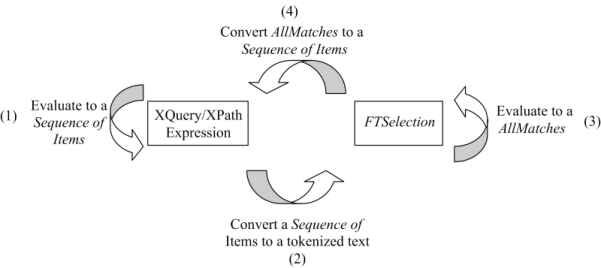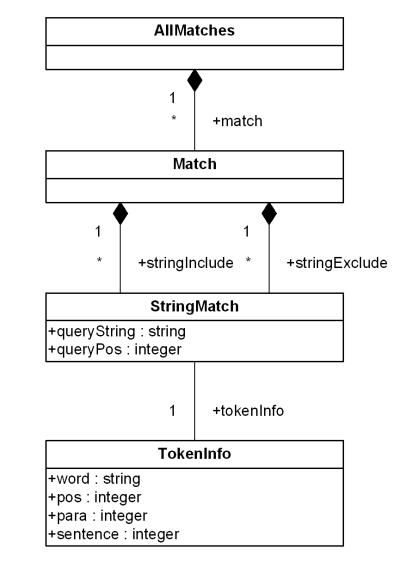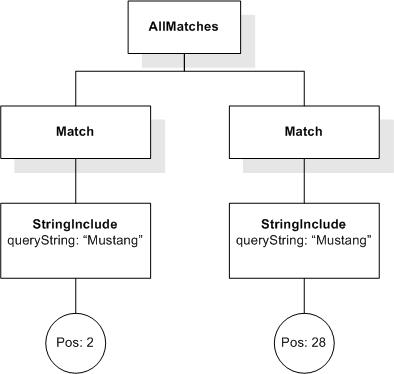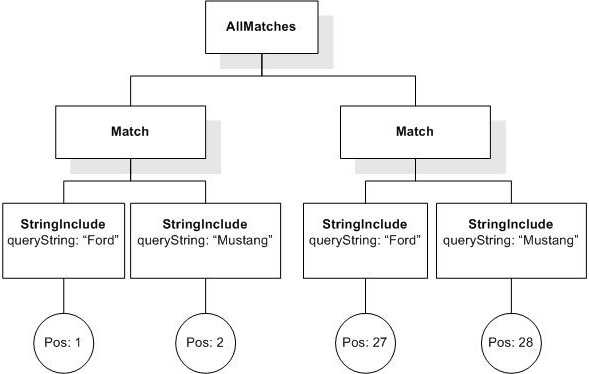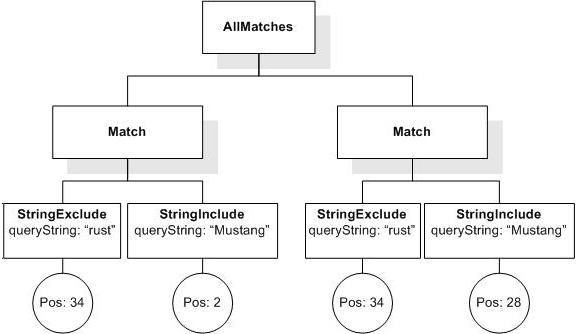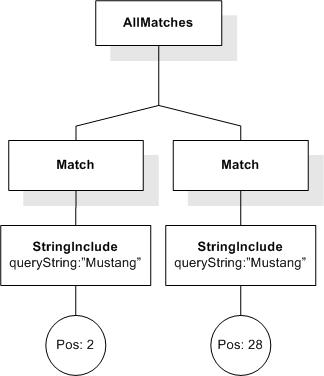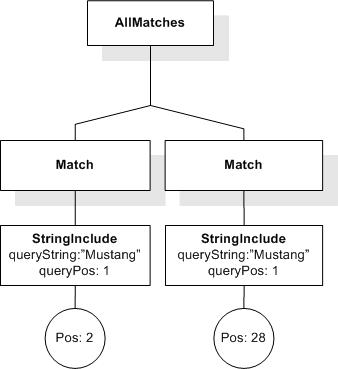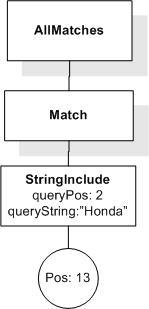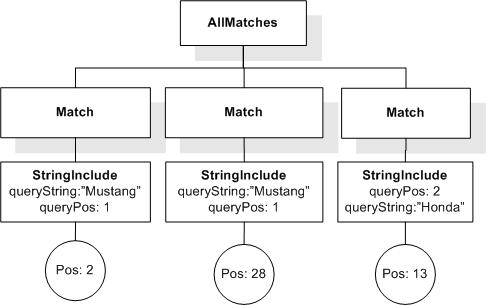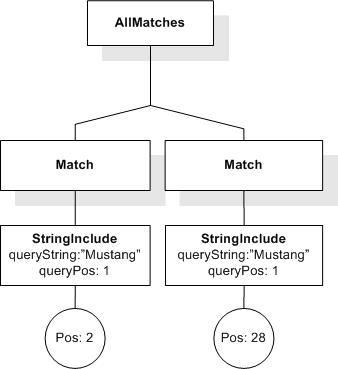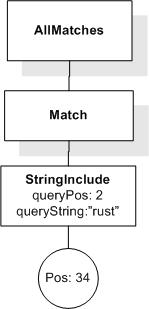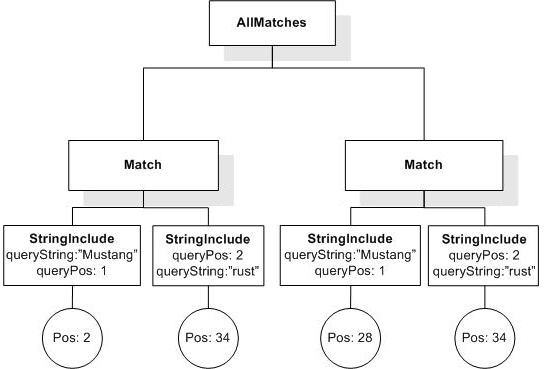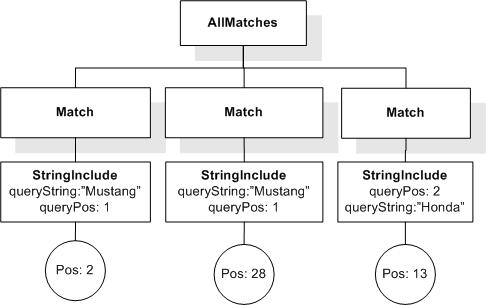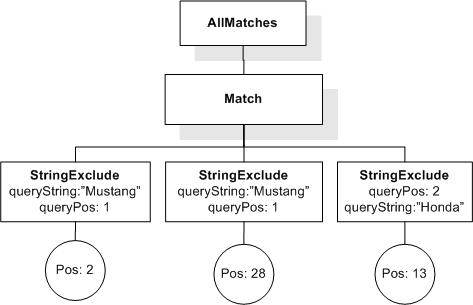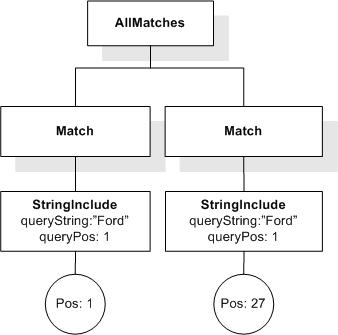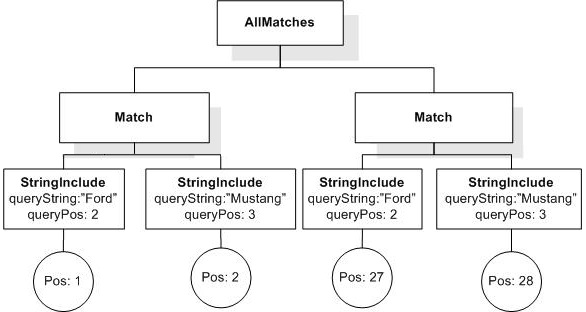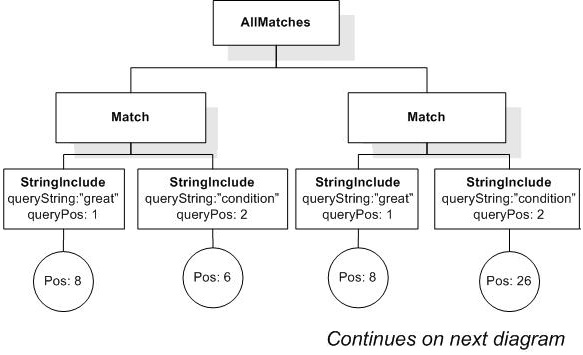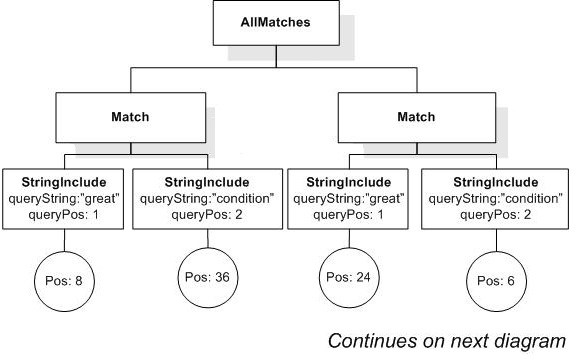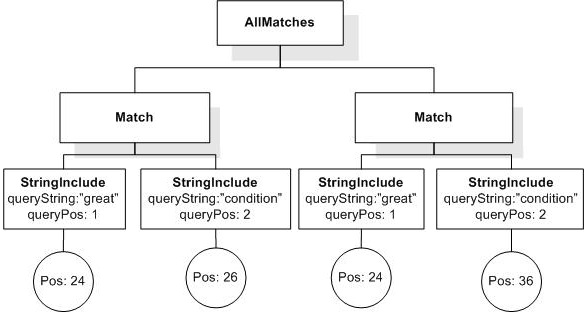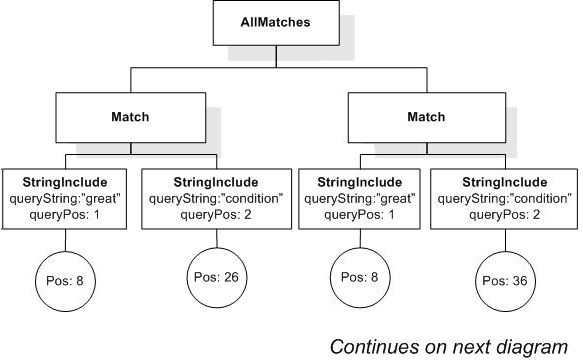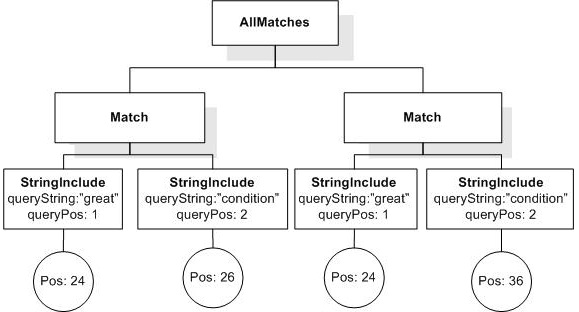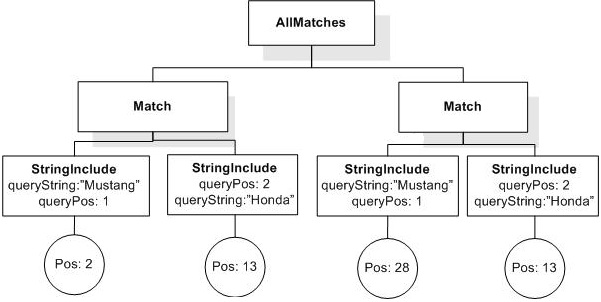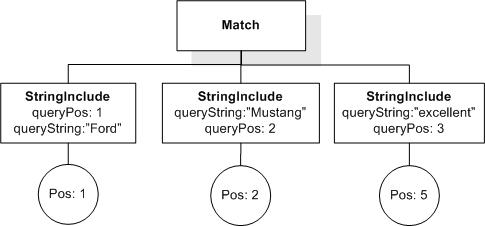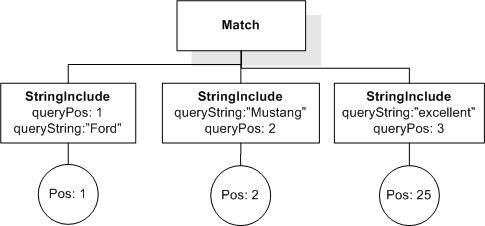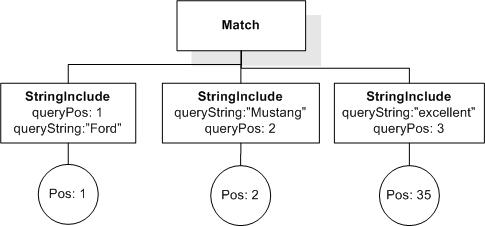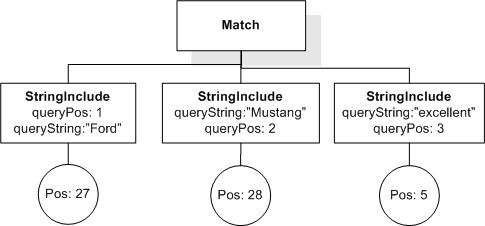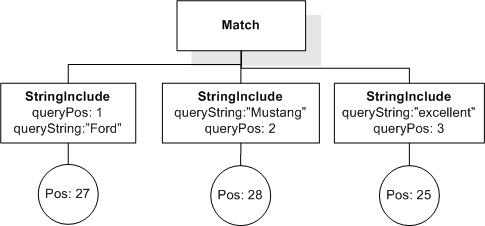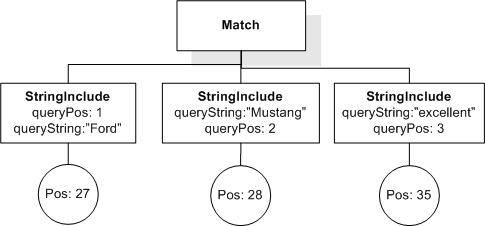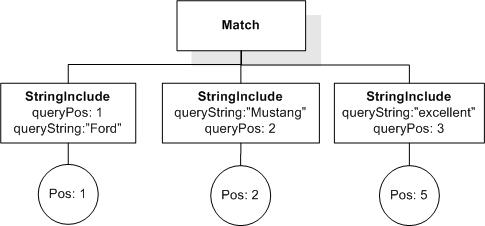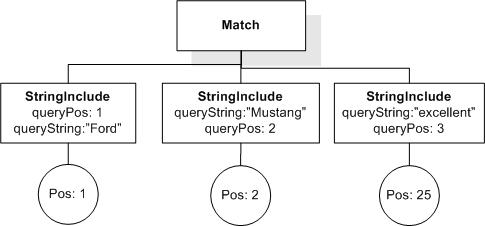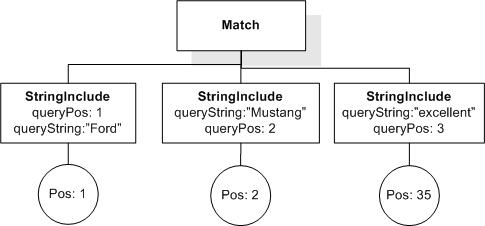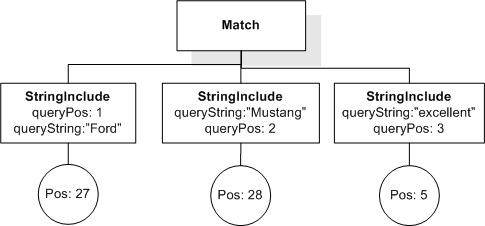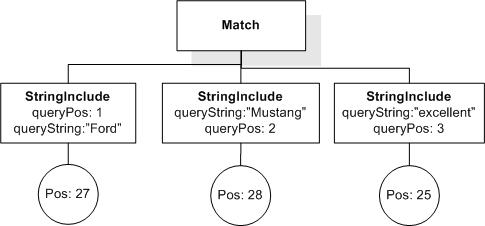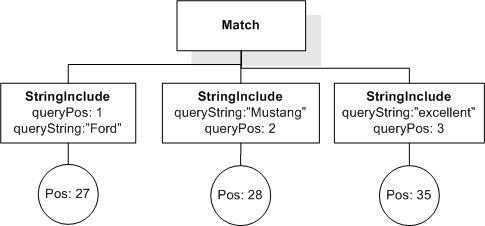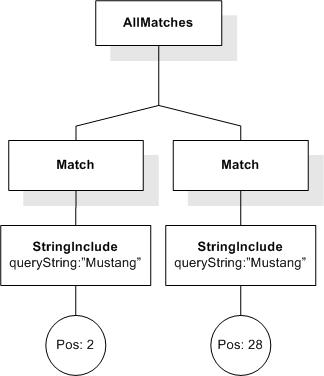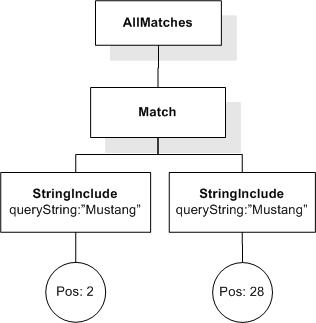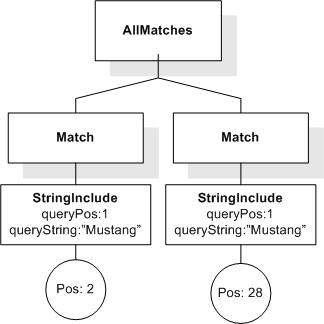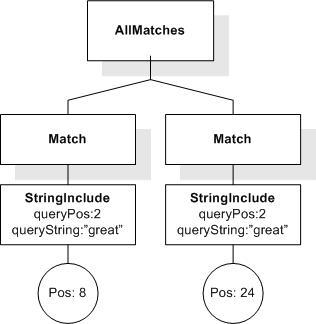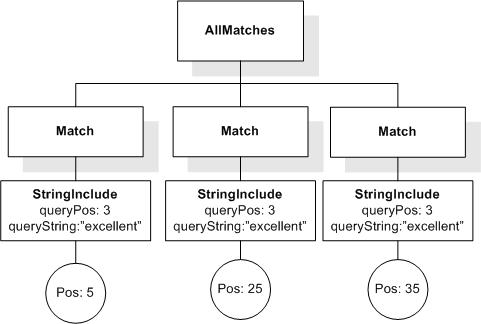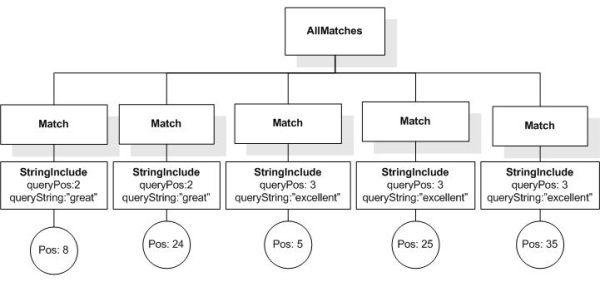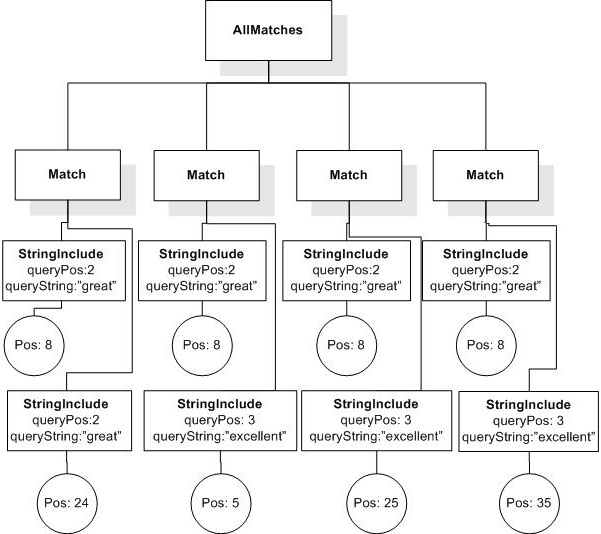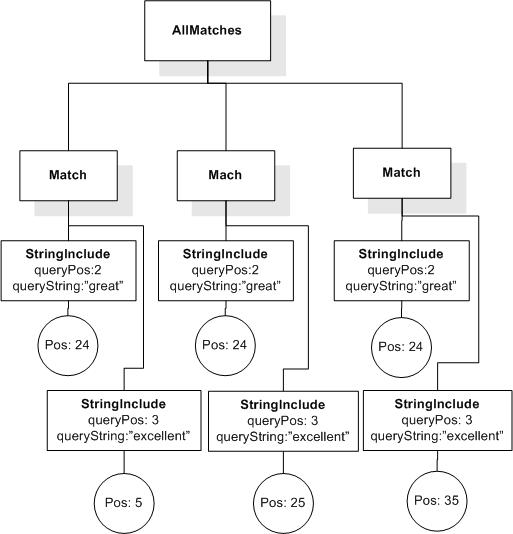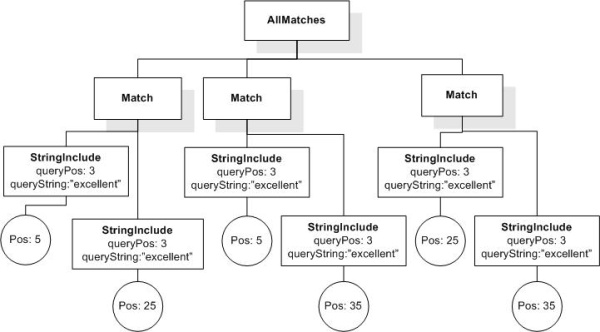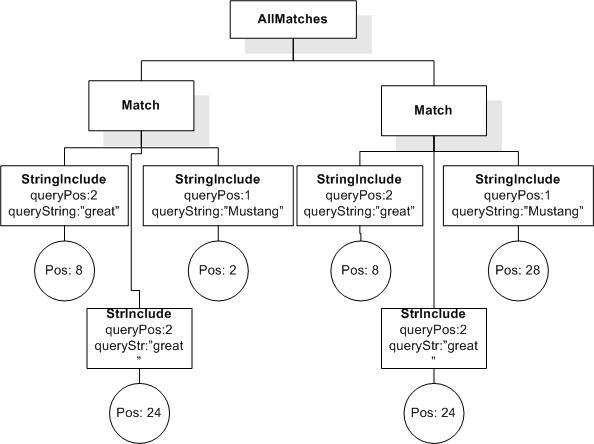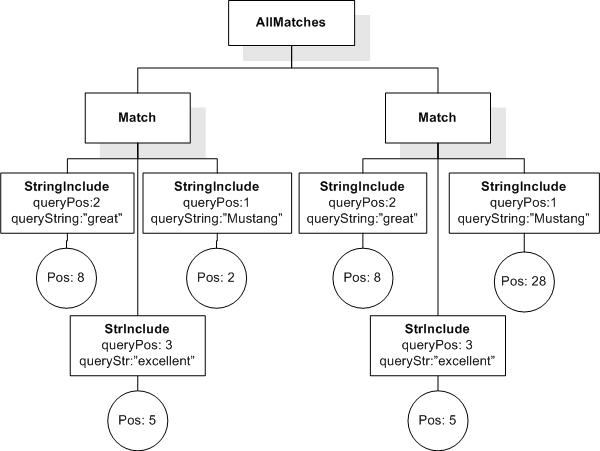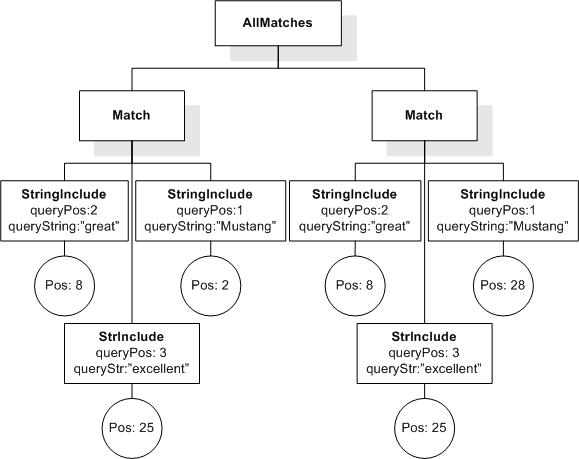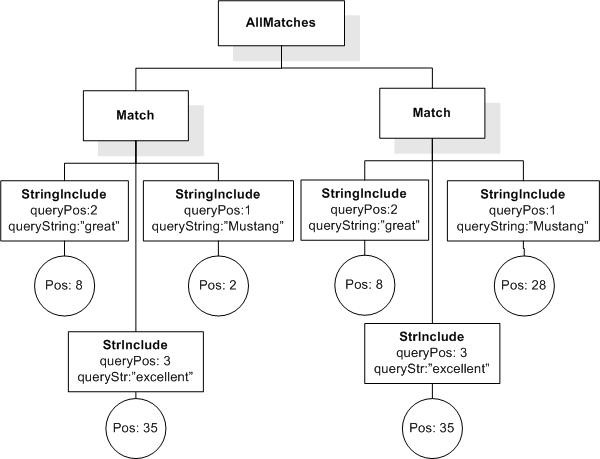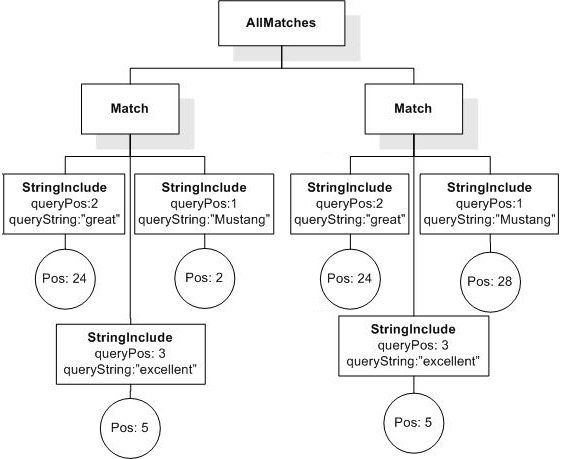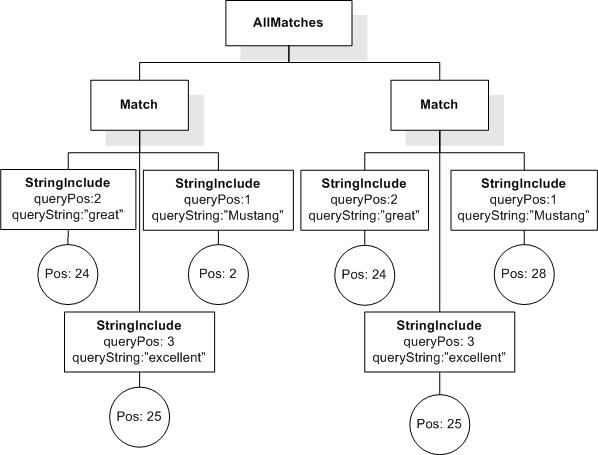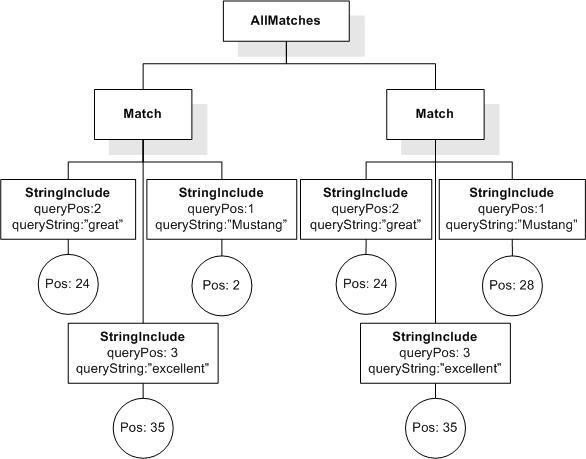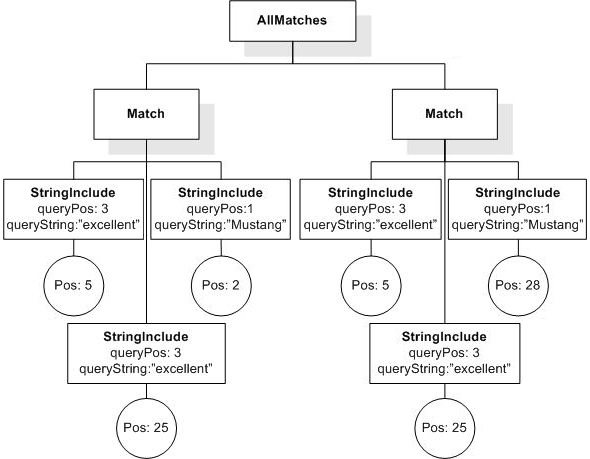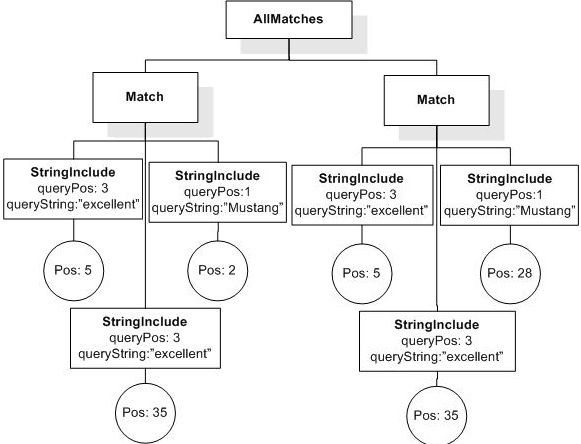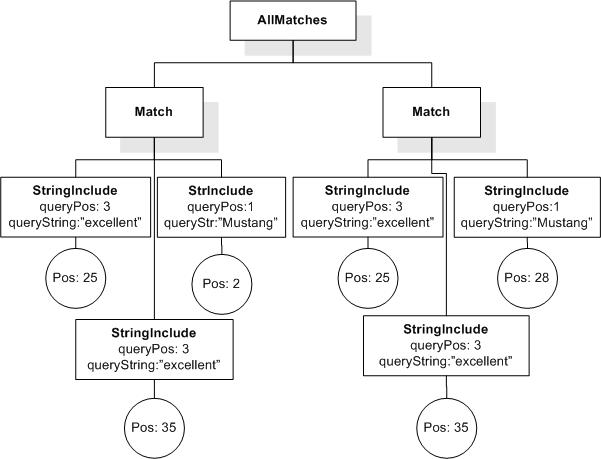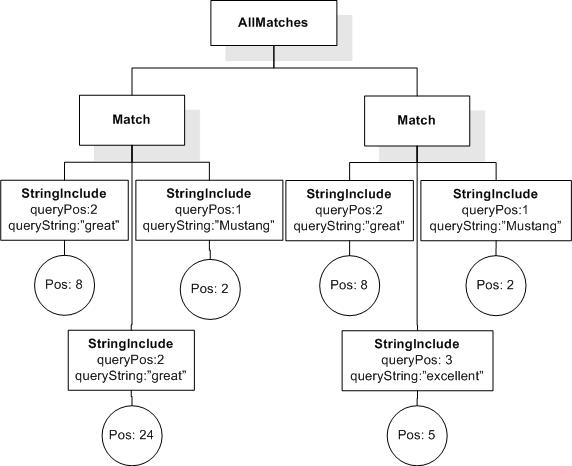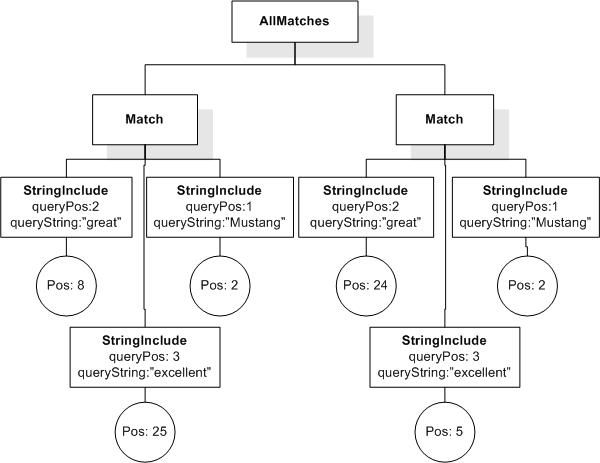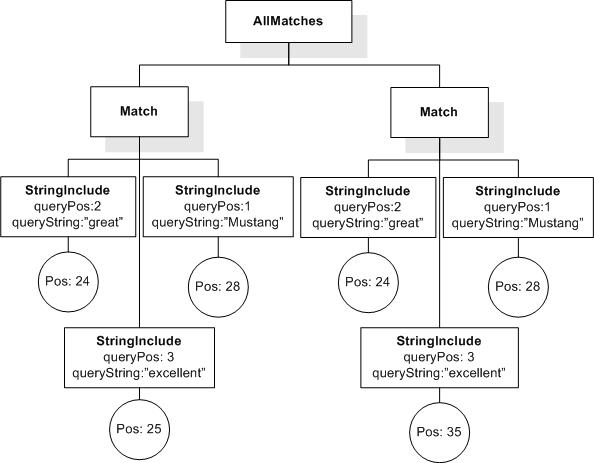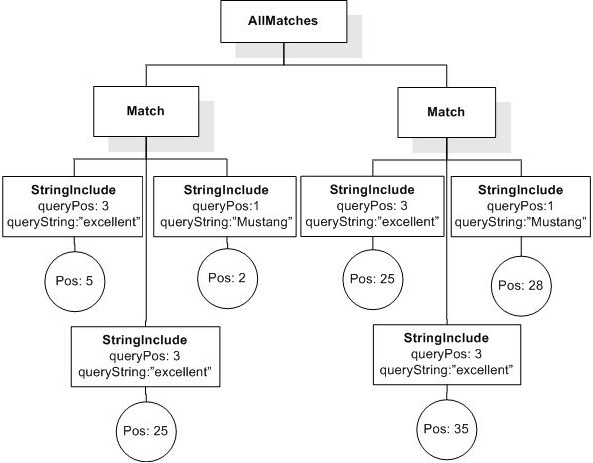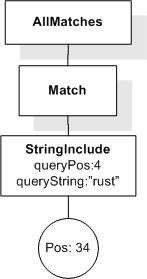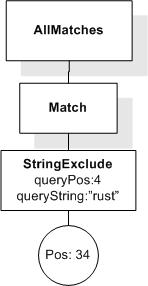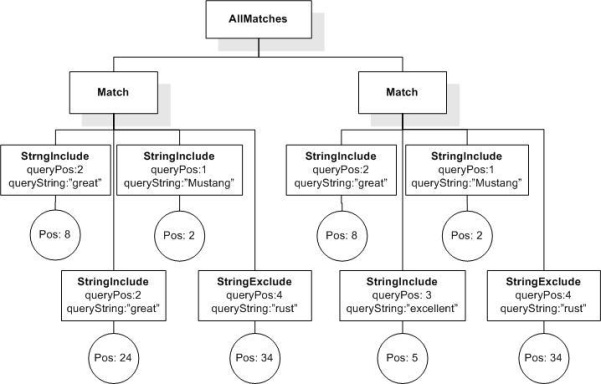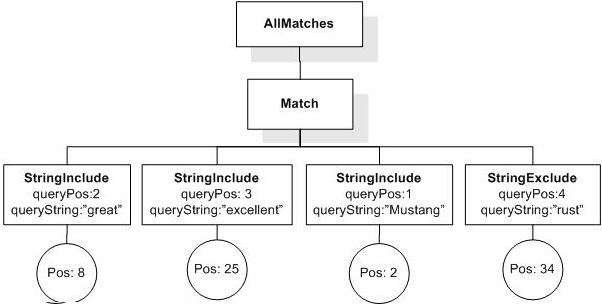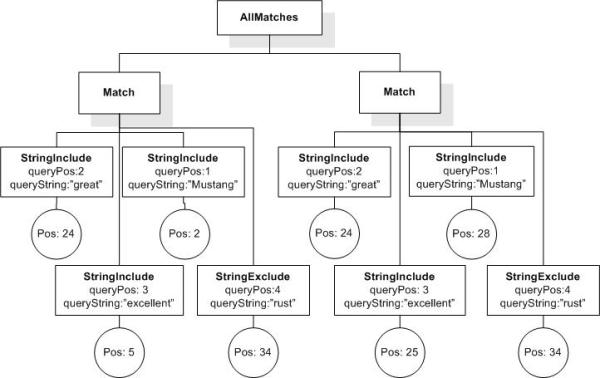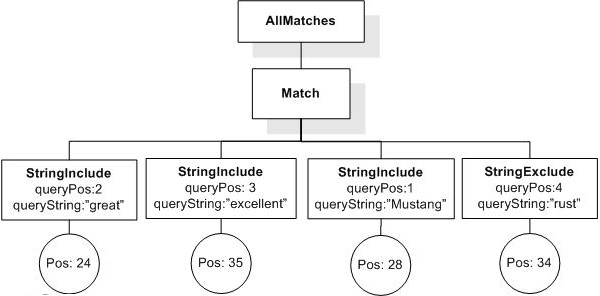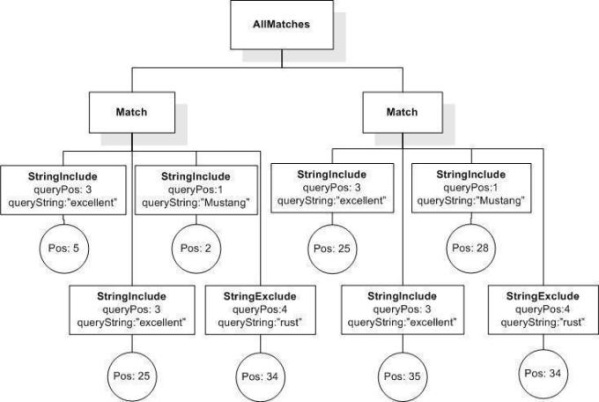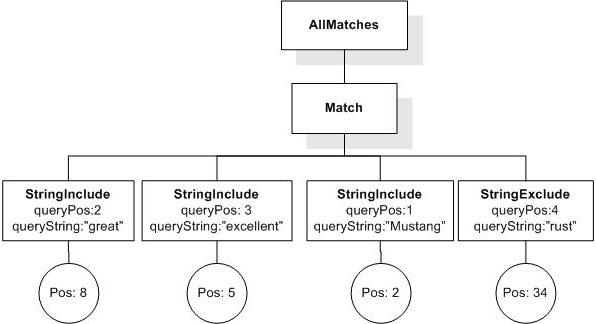D Issues List
This section contains the current issues related to this document.
Issue (scoring-properties):
Scoring Properties
Is it possible to specify anything other than range ? Examples: do we want to define scoring rules for efficient scoring, rules to guarantee score monotonicity?
Resolution:
None recorded.
Issue (scoring-values):
Scoring Values
Do we require that 0 be returned if there are no matches?
Resolution:
None recorded.
Issue (data-model):
Semantics Data Model
Data model incorporates new names - TokenInfo, Match, AllMatches.
Resolution:
CLOSED.
All occurrences of FullMatch, SimpleMatch, and Position in the text, in the schemas, and in the XQuery implementations of the semantics have been replaced with AllMatches, Match, and TokenInfo respectively.
Issue (ftcontains-grammar):
FTContains Grammar
Expr "ftcontains" FTSelection FTIgnoreCtxMod?. One production for FTSelection which includes FTIgnoreCtxMod?
Resolution:
CLOSED.
We replaced the previous grammar production Expr "ftcontains" FTSelection that allowed FTIgnoreCtxMod to be combined with any FTSelection with the new one that restricts the application of FTIgnoreCtxMod to the highest level.
Issue (ftcontextmodifiers):
FTContextModifiers
Paull C.: Change the name of the FTContextModifer production which modify the operational semantics of the FTSelections they are applied to. Abandon the use of "ContextModifier" as in FTCaseCtxMod, FTStemCtxMod, FTIgnoreCtxMod. Issue raised at FTTF Feb 5-6, 2004 meeting. Find in the minutes at: http://lists.w3.org/Archives/Member/member-query-fttf/2004Feb/0010.html (Cntl-F on FTContextModifiers) (W3C members only)
Resolution:
CLOSED.
Replaced FTContextModfiers with FTMatchOptions as in FTCaseOption, FTStemOption, FTIgnoreOption in the Feburary 26, 2004 Editor's Draft.
CLOSED February 26, 2004.
Issue (grammar):
Grammar
Grammar: Where does the ftcontains expression belong in the XQuery grammar: Boolean expression or comparison expression?
Resolution:
CLOSED.
The ftcontains expression plugs in to the XQuery grammar in the "FTComparisonExpr" production. This seems to give ftcontains the correct precedence among other XQuery operations, and it makes intuitive sense.
Issue (wildcards):
Wildcards
Pat Case: There are a few inconsistencies between this document and the Use Cases Working Draft.
This document and the Use Cases Working Draft present different syntax in regex examples. I can find no syntax provided in this document for the starts-with and exact match functionality. Should we rename the Wildcard section in the Use Cases to Regex Section and possibly rethink the use cases?
Resolution:
None recorded.
Issue (thesaurus):
Thesaurus
Thesaurus names: "synonyms", "narrower terms", "soundex", "spellcheck" and "wordnet". We need to define Thesaurus operators. We need more options when specifying thesaurs: Name, URI, Depth, Dimension. Standards. ISO 2788/ANSI Z39.19.
We need to discuss what the grammar of ThesaurusMatchOption is. Current grammar is:
FTThesaurusOption ::= ("with"? "thesaurus" Expr) | "without thesaurus".
Proposed grammar is:
FTThesaurusOption ::= ("with"? "thesaurus" Expr "operation" Expr) | "without thesaurus".
Resolution:
None recorded.
Issue (window):
Window
Currently, FTDistanceSpec only permits a single distance specification for all of the terms specified by an FTSelection.
For example:
("dog" && "cat" && "bird") with word distance at most 10
In this scenario above, the terms "dog", "cat", and "bird" must all occur within 10 words of one another.
However, if one would want to return documents where "dog" occurs within 10 words of "cat" and this SAME "cat" term occurs within 5 words of "bird", it is currently not possible with the current language specification. The best that could be done is the following:
(("dog" && "cat") with word distance at most 10) and (("cat" && "bird") with word distance at most 5)
But, this will not lead to the exact desired result because the "cat" and "bird' comparison will not use only those "cat" terms which occurred within 10 positions of "dog" ... it can use any "cat" term within the search context.
Resolution:
None recorded.
Issue (mildnot):
MildNot
Andrew E.: Should we remove the mild not? It has never been included in a query language before.
Pat Case has provided use cases to justify its inclusion at: http://lists.w3.org/Archives/Member/member-query-fttf/2003Dec/0034.html (W3C members only)
Discussion followed. Michael Rys' reply: http://lists.w3.org/Archives/Member/member-query-fttf/2003Dec/0038.html (W3C members only)
Pat Case's reply: http://lists.w3.org/Archives/Member/member-query-fttf/2003Dec/0043.html (W3C members only)
Use case paraphrase (for non-members): Consider a collection of 3 documents:
-
The Delights of Mexico - a document that includes "Mexico" several times.
-
The Perils of New Mexico - a document that includes "New Mexico" several times.
-
Travel in North America - a document that includes both "Mexico" and "New Mexico" several times.
Suppose you are planning a trip to Mexico. You want documents 1 and 3, but not 2. You could search for "Mexico" and get documents 1, 2 and 3. Or you could search for "Mexico AND NOT 'New Mexico'" and get just document 1. But the "strong not" has ruled out document 3 - even though it contained the thing you were looking for - just because it contained the thing you were not looking for.
The "mild not" operator allows you to say "Mexico MILD NOT 'New Mexico'", which means "find me all the documents that contain 'Mexico'. Do not take any notice of occurrences of 'New Mexico', but do not rule out a document just because it contains 'New Mexico'".
There are many cases where you may want to search for a word, but NOT get documents just because they contain a common phrase that includes that word. e.g. "security" mildnot "social security", "house" mildnot "house of representatives", "estate tax" mildnot "real estate tax"
Resolution:
None recorded.
Issue (markup-vs-structure):
Markup vs Structure
Some tags are "markup" - e.g. b - some are "structure" - e.g. title. We generally want to treat structure tags as word boundaries, but not markup tags. How do we distinguish between markup and structure?
Michael to provide reformulation.
Resolution:
None recorded.
Issue (matchoption-policy):
MatchOption Policy
We need some indirection to specify match context, defaults "Thesaurus name" gives us a way to define a thesaurus, then specify it in the query - an indirection. Steve Buxton proposes there are many classes of things that are needed for context-match (stoplist, special characters, etc.) that need an indirection. So we need an extra level of indirection - a named policy that refers to a set of named things.
Resolution:
None recorded.
Issue (loose-grammar):
Loose Grammar
The grammar allows lots of queries that do not make sense. e.g. "(dog || cat) within word distance N", "dog within word distance N", "(dog || cat) ordered", "!dog 5 times" If the grammar does not provide a way of identifying these "nonsense queries", then the implementation still has to identify them - i.e. implementors will have to augment the grammar to identify nonsense queries, and augment the semantics to do something with them.
J. Doerre asks if we should allow nested FTNegations in the RHS of a FTMildNegation. From his email (http://lists.w3.org/Archives/Member/member-query-fttf/2004Apr/0019.html (W3C members only)) point 3: "The ApplyFTSelection ignores all StringExcludes in the arguments of the FTMildNegation. I think, if we don't want to deal with StringExcludes in that function, we should explicitly forbid them to appear, i.e. require
arguments of FTMildNegation to not include any FTNegation."
Resolution:
None recorded.
Issue (fttimesselection):
FTTimesSelection
How do I count occurrences, where the query is NOT a single term?. How many occurrences of "!dog" are there in "very very big"? Zero or very many?
Resolution:
None recorded.
Issue (regexp-escape):
RegExp Escape
Need to define some escaping mechanism for regexp characters, and for (||, ...).
Resolution:
None recorded.
Issue (ftscopeselection):
FTScopeSelection
Is there a need for both FTScopeSelection and FTDistance ? For example, how is the 'same sentence' or 'same paragraph' really different than a FTDistance of 'with sentence exactly 1' or 'with paragraph exactly 1'?.
Resolution:
None recorded.
Issue (weighting):
Weighting
Michael R.: What syntactic form should scoring take? How do we describe the constraints on the types of expressions that are allowed? Should scoring be expressed using a second-order function, a stand-alone operator, or as a clause in a FLWOR expression? Consider moving weighting to ftContains, something like the following: TreatExpr ("ftcontains" FTSelection ("weight" Expr)? )?
Options in presentation of full-text language proposal and some discussion at XQuery January meeting, Tampa at: http://www.w3.org/XML/Group/2004/01/xquery-minutes (W3C members only) (Cntl-F on Report of Full-Text Task Force)
Resolution:
None recorded.
Issue (weight-values):
Weight Values
Valid values for weights must be defined.
Resolution:
None recorded.
Issue (ftscopeselection-on-structure):
FTScopeSelection on structure
Scoping based on structure (e.g. same node and different node) should be considered. Support for queries where distance is measured in terms of "number of intervening elements" where elements can be any markup including chapter, paragraph and sentence. Consider sentence/paragraph/node distance.
Resolution:
None recorded.
Issue (languagematchoption):
LanguageMatchOption
What is the default language? SA: Dana F.: does the language have to be a literal or an Expr thyat returns xs:string? Is there an implementation-defined list of valid languages ?
Resolution:
None recorded.
Issue (casematchoption-specialcharmatchoption):
CaseMatchOption and SpecialCharMatchOption
Paul C. pointed out whether "lowercase", "uppercase", "case sensitive" and "case insensitive" should be defined in the context of Unicode. J. Doerre provided this link to the Unicode standard is: http://www.unicode.org. The current version is 4.0.0. Case folding is described in Chapter 3.13. Please note that the case folding operations, like toUppercase(X), only depend on the characters to be folded, not on additional information, like language.
Resolution:
None recorded.
Issue (diacriticsmatchoption):
DiacriticsMatchOption
Paul C.: We need to define what a diacritic is. Steve B. pointed out whether "with diacritics" and "without diacritics" are needed or not.
Resolution:
None recorded.
Issue (tokenizers):
Tokenizers
Darin/Paul C.: What is the most general behavior for tokenizers?
Michael Kay: Can we define a set of rules that apply regardless of which tokenizer we are using in the same manner as the rues we defined for scoring? For example, we could impose constraints on words, sentences and paragraphs.
Resolution:
None recorded.
Issue (specialcharmatchoption):
SpecialCharMatchOption
We need to say more about special characters, what kind of special characters do we want to consider, what is their impact on the ability to use a given index, their impact on tokenization.
Resolution:
None recorded.
Issue (matchoption-syntax):
MatchOption Syntax
Paul C.: It maybe that we should reconsider the syntax and allow to apply modifiers to individual words.
Resolution:
None recorded.
Issue (stopwordsmatchoption):
StopWordsMatchOption
We need to say more about stopwords, what kind of stopwords do we want to consider, what is their impact on the ability to use a given index, their impact on tokenization. Should we allow to specify the URI of a StopWords list? Paul C.: What would a single search with a stopword return?
Resolution:
None recorded.
Issue (matchoptionstokenization):
MatchOption and Tokenization
Does the language document clearly state the impact of match options on tokenization? Consider regex * when does it get applied? What effect does it have on word breaks? Example: expr ftcontains "brown .ox" with regex, expr ftcontains "brown .*ox" with regex.
Resolution:
None recorded.
Issue (ignoresyntax):
IGNORE Syntax
Do we need special syntax for IGNORE in case of level by level search?
Resolution:
None recorded.
Issue (scoping):
Scoping
Do we need same sentence, same paragraph search? * in semantics, not in requirements.
Resolution:
None recorded.
Issue (precedencexqueryfulltext):
Precendence of XQuery and full-text
We need to distinguish between XQuery expressions embedded in full-text expressions and FTSelections themselves. S. Buxton suggests that we use different kinds of parentheses to distinguish between these two expressions. See his message in http://lists.w3.org/Archives/Member/member-query-fttf/2004Apr/0042.html (W3C members only) and subsequent messages. A simple example is to distinguish between ("cat") as an XQuery
expression that builds an XQuery sequence and ("cat") as an FTSelection.
In the current draft of the document, we are using lookahead
Other possibilities include the use of "{}" to switch from fyll-text to XQuery when XQuery expressions are embedded in full-text expressions. This is similar to element construction in XQuery and has been pointed out by Mary H in her email at http://lists.w3.org/Archives/Member/member-query-fttf/2004May/0163.html (W3C members only)
Resolution:
None recorded.
Issue (ftdistancewith):
Optional Keyword "with" in FTDistance
In 3.1.9 FTDistance: Do we need "with" in FTDistance?
Raised by Pat Case by email April 28, 2004
Resolution:
None recorded.
Issue (ftwindowwithin):
Optional Keyword "within" in FTWindow
In 3.1.20 FTWindow: Do we need "within" in FTWindow?
Raised by Pat Case by email April 28, 2004
Resolution:
None recorded.
Issue (ftspecialcharoption-issue):
FTSpecialCharOption Specify Which
In 3.2.3 FTSpecialCharOption: Should we have to or be able to specify which special characters are to be matched or not? Should the following syntax be allowed "without special characters "-" or "with special characters "-"?
Raised by Pat Case by email April 28, 2004
Resolution:
None recorded.
Issue (ftnegationunarynot):
FTNegation Includes Unary Not
In 3.1.5 FTNegation: If we are supporting the unary not which is shown in the production, please add text and examples to show that both the "unary not" and the "and not" are supported.
Raised by Pat Case by email April 28, 2004
Resolution:
None recorded.
Issue (ftorderunordered):
FTOrder Unordered Option
In 3.1.7 FTOrder: [30] FTOrder ::= FTSelection "ordered" should we have an explicit "unordered" for the default?
Raised by Pat Case by email April 28, 2004
Resolution:
None recorded.
Issue (ftignoreoptionnaming):
FTIgnoreOption Naming
Would FTFilterOption be a better name than FTIgnoreOption?
Raised by Pat Case by email April 28, 2004
Resolution:
None recorded.
Issue (ftrangespecsyntax):
FTRangeSpec Syntax for 1 to 4
We should consider aligning the syntax for the FTRangeSpec with an upper and lower boundary in 3.1.9 FTDistance (from 1 to 4) with the syntax for using range expressions to construct sequences in XQuery and XPath (1 to 4), See the XQuery/XPath language document Section 3.3.1 Constructing Sequences.
Raised by Pat Case by email April 28, 2004
Resolution:
None recorded.
Issue (booleannaming):
Boolean (&& || !) Naming
Is it not possible and maybe preferable to use ftand ftor ftnot instead of && || ! following the lead of ftcontains?
Raised by Pat Case by email April 28, 2004
Resolution:
None recorded.
Issue (exactelementcontent):
Exact Element Content
We have a use case for an exact element content query which finds the exact words or phrases being queried, no more and no less in an element and allows variations on case, diacritics, and special characters. Should this functionality be in XQuery full-text? If so, should we use the keywords "exact content"?
Raised by Pat Case by email April 28, 2004
Resolution:
None recorded.
Issue (startswith):
Starts With
We have a use case for a starts with query which finds the words or phrases being queried as the first content of an element. Should this functionality be in XQuery full-text? If so, should we use the keywords "starts with"?
Raised by Pat Case by email April 28, 2004
Resolution:
None recorded.
Issue (mild-not-naming):
What should we call the mild not
The name "mild not" or "mild negation" is not really helpful in understanding what we want it to denote. We should try hard to find a better name for this construct. Since it is used to exclude certain matches, why not call it "FTMatchExclude" or just "FTExclude"? Keeping "mild not" as the name makes it recognizable as a form of "not". If it remains as "mild not" and the ! continues as the syntax for "not", consider using mild! as the syntax for "mild not".
Raised by Jochen by email April 21, 2004; Additional comments by Pat Case May 4, 2004
Resolution:
None recorded.
Issue (multi-word-phrases-thesauri-lookup):
Thesauri lookup for multi-word phrases
It should be decided whether thesauri lookups can be performed only on single words or whether it is possible to apply it on multi-word phrases. For example, should we allow the thesaurus to replace "bells and whistles" with "frills"?
In the latter case, should thesauri lookup be applied only to the FTWord "bells andwhistles", or should it applied also on ("bells" "and" "whistles") phrase? Another question is if the thesauri expansion can be applied on phrase and on a word in the phrase, which one takes precedence.
Resolution:
None recorded.
Issue (exactly):
Exactly in FTRangeSpec
Should "exactly" be optional? Should we allow both "word distance 6" and "word distance exactly 6"? Raised at Redmond May 2004 by Steve Buxton and Pat Case.
Resolution:
None recorded.
Issue (matchoptions-defaults):
MatchOptions Default
We need to specify defaults for MatchOptions. We should align this default with the static content for XQuery/XPath and add to the XQuery prolog corresponding declarations to set query-wide defaults.
Resolution:
None recorded.
Issue (zero-length-phrase):
Zero-length phrase
If Expr in FTWords results in the empty sequence or the tokenization results in a zero-length phrase, the result is? Always a match, never a match? Depending on the keyword?
Resolution:
None recorded.
Issue (stopwordsoptions):
Stop words option
The syntax and semantics of stop words are still under discussion.
3.2.6 FTStopwordOption is inconsistent with the grammar and semantics.
-
the second example includes "without stop words" NOT followed by an expression, which is not valid according to the EBNF (see also the default options query in 3.2 FTMatchOptions)
-
the keyword "additional" is not part of the current grammar
-
the text and examples in 3.2.6 FTStopwordOption imply that queries work as though stop words were removed from documents before positions are calculated, which is inconsistent with the description in 4.2.4 FTStopWordOption
Resolution:
None recorded.
Issue (grammar-precedence):
Grammar Precedence and Lookahead
When integrating the XQuery Full-Text grammar with the XQuery 1.0 grammar, there were a number of challenges. Challenges include (using pseudo-code for examples):
-
The Full-Text operators must have the correct precedence (binding order) with respect to XQuery operators
-
It must be possible to override the default precedence of the Full-text operators - e.g. you must be able to express "(cat and dog) or mouse" as well as "cat and (dog or mouse)"
-
You must be able to embed XQuery expressions in the Full-Text expression, e.g. "cat and $i"
-
You must be able to embed the XQuery Full-Text expression in an arbitrarily-complex XQuery expression, e.g. "where title ftcontains ('dog' and 'cat') and price/dollars < 3 or disclaimer ftcontains 'buy this'"
The Working Groups discussed a number of ways of achieving this. The current grammar satisfies these requirements at the cost of introducing ambiguity in one place. The current XQuery 1.0 grammar is LL(1) - i.e. it is possible to write a parser that reads a query from left to right and only looks 1 token ahead. But the XQuery Full-Text grammar is NOT LL(1). At [PROD: 168] the parser must lookahead a full non-terminal - it must try to expand FTWords, and
if that fails it must try to expand (FTSelection).
This is still under discussion - the Working Groups may remove the requirement for lookahead in a future publication.
Resolution:
None recorded.
